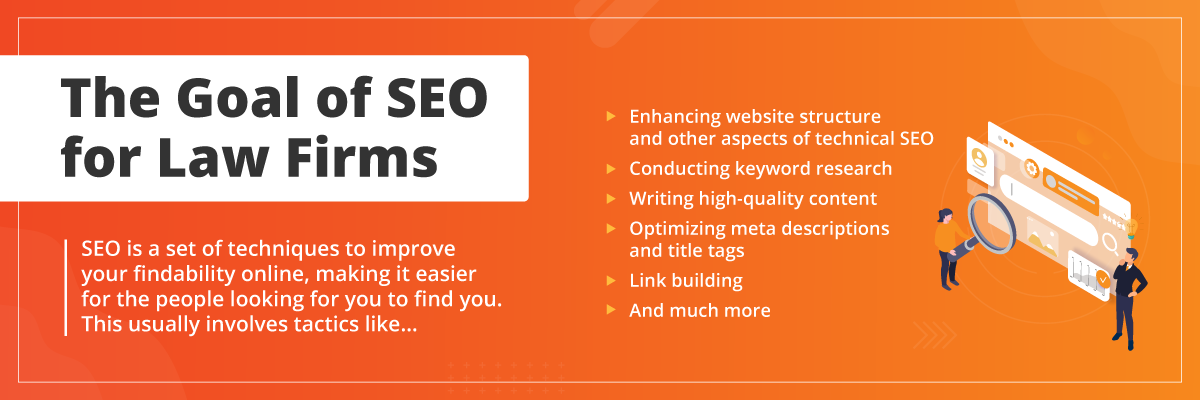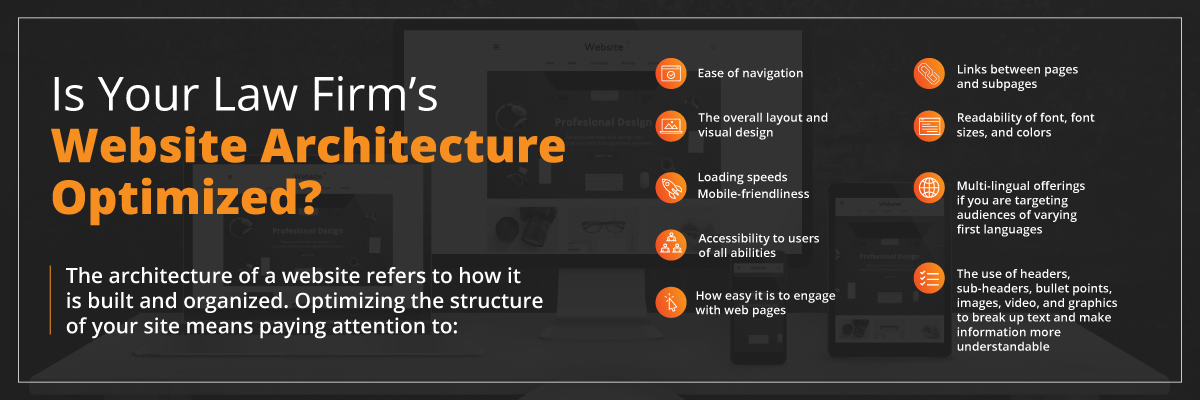Law Firm SEO
Whether you’ve been trying search engine optimization (SEO) tactics for years and are looking for better results—or you’re just starting to ask S-E-what?—our comprehensive guide to law firm SEO has the answers.
In this following guide to legal SEO, you’ll find information on:
- How law firms can benefit from search engine optimization (SEO)
- What “lawyer SEO” really means for your law firm’s future
- Creating ideal content for a law firm website
- Understanding search engine rankings and why they matter
- How to conduct and utilize keyword research
- The impact of technical elements and core web vitals on SEO
- The difference between on-site SEO and off-site SEO for law firms
- Ways to rank higher in local search results
- How to implement a law firm SEO strategy from the ground up
Our Law Firm SEO Guide for Lawyers in 2023
So what exactly is law firm SEO? Law firm SEO (or attorney SEO or lawyer SEO) refers to search engine optimization for the legal industry. SEO is a set of strategies to improve search engine rankings. The goal is for your law firm’s website to appear at the top of the page when a potential client uses Google and other search engines to look for a law firm like yours.
SEO increases visibility. Because if no one sees your law firm in an online search, your business suffers.
At GAVL, we keep a constant finger on the pulse of the legal marketing industry—and we know that there’s no future without SEO.
Our predictions don’t come out of thin air. Law firm SEO and digital marketing are what we eat, breathe, and live. We are a full-service digital marketing agency that serves lawyers and lawyers only. Our company was co-founded by attorneys who know that keeping a law firm in business requires more than just word-of-mouth and referrals.
To grow your law firm in 2023 and beyond, you need a good SEO strategy. Period.
Why Is SEO Important for Lawyers, Law Firms, and Attorneys?
Let’s say you are a law firm of personal injury attorneys in Indianapolis. It’s a good bet that people looking for legal representation in your city are going to use phrases like “Indianapolis personal injury lawyer” and “personal injury lawyer near me” to find what they’re looking for.
They may even be more specific in their search, using their keyboard or cell phone talk-to-text function to make queries like “how much does it cost to hire a lawyer in Indianapolis,” “best car accident lawyers in Indianapolis,” or “do I need a lawyer to sue a nursing home in Indiana.”
When a person in need of your services makes these online searches, what do they see? Do they see your firm’s name? Do they see your website, your outstanding client reviews, and your recent articles on the very topic they want to know more about? Law firm and attorney SEO works to make sure that they do.
It’s said that one in three searches for an attorney starts online.
Today, that’s probably a conservative estimate. Even if someone initially hears about your practice through word-of-mouth, odds are they’re still going to first go online and read your reviews and webpage postings before ever giving you a call.
As much as we’d like to think that our hard work and victories speak for themselves, that’s just not the way it works. Most consumers want to see who you are online before they’re willing to see who you are in person.
The Goal of SEO for Law Firms
The goal of SEO is to make sure your law firm’s website comes up at the top of the search results pages when someone from your target audience searches for someone like you.
SEO is a set of techniques to improve your findability online, making it easier for the people looking for you to find you. This usually involves tactics like…
- Enhancing website structure and other aspects of technical SEO,
- Conducting keyword research,
- Writing high-quality content,
- Optimizing meta descriptions and title tags,
- Link building,
- And much more.
If you swung open the clock face of the SEO machine, you’d see a highly intricate set of gears and cogs working together at the most detailed level. But at its core, SEO is really just based on…
- Knowing who your target audience is
- Knowing what words and phrases your prospective clients are using to search
- Knowing the intent of searchers
- Understanding why search engines like Google rank some pages higher than others
- Taking measures to prove that your page deserves to be at the top of the search engine results page
What’s the Difference Between On-Page SEO and Off-Page SEO?
Before deep diving into what your law firm’s SEO implementation might involve, let’s first break down the main types of SEO that law firms need to understand:
- On-page SEO
- Off-page SEO
On-Page SEO
On-page SEO is everything you do to your website to make it optimized for search engines. It’s essential to make sure all the elements of your page—no matter how minor—are working together toward the common goal of search engine optimization.
On-page SEO involves optimizing:
- Webpage written content
- URLs, titles, and descriptions
- Internal linking
- Headers and sub-headers
- Images and alt text
- Structured data
- And more
Off-Page SEO
Off-page SEO encompasses actions that take place away from your site itself. Most of the time, off-page SEO involves working to secure high-quality backlinks. Backlinks are links pointing to your website from another third-party website.
As a law firm, search engines see you as an industry authority when you have a lot of relevant, trustworthy sites referencing your firm’s site. Good backlinks might come from:
- Law directories
- Bar associations
- Trustworthy news outlets
- Charity, sports, education, or other organizations your firm sponsors
- Event pages for events in which your lawyers are involved
- Fundraisers your firm is sponsoring
- CLE opportunities being taught by your firm’s attorneys
- Schools or colleges in your local area
- Law schools
- Organization pages detailing awards your lawyers have won
- Local business directories
- Social media accounts
The thing about backlinks is that more is not always better. A good rule of thumb is that the harder a backlink is to secure, the more valuable it is. An abundance of junky, low-quality backlinks will only work against you in SEO terms.
At GAVL, we run strategic backlink campaigns that help our law firm clients secure prized links from credible, relevant industry and local websites.
What Does SEO for Lawyers Look Like?
Attorney search engine optimization involves a variety of targeted SEO efforts that work together to increase your law firm’s visibility to potential clients. When we develop, audit, and manage law firm websites, we work to make them both user-friendly and easily recognizable to search engines. We use an area-targeted SEO approach that ensures you’re able to rank in every city you want to rank in.
Let’s look at the strategies often used in SEO for lawyers:
- Keyword research, including research in targeted cities and areas
- SEO ranking factor analysis
- Competitor analysis
- Content optimization
- Website structure optimization
- Technical SEO
- Legal blogging
- Performance evaluation and assessment
Take Time To Understand Google’s Ranking Factors.
There are billions of websites out there. An SEO ranking factor is a signal used by search engines to identify the “good” websites. These are standards by which Google and other companies measure quality and relevance to the search query.
Google uses hundreds of ranking factors. The company is notoriously enigmatic about what factors it actually uses and which are the most important. After all, if everyone knew the formula, everyone could cheat the system. The organic search results would no longer be organic.
Instead, it’s the job of SEO experts to conduct analysis and figure out which ranking factors are used to evaluate and rate websites. These factors change often as search engines become smarter and more refined.
It’s believed that factors like these are important to measuring relevancy signals and the value of a website to the searcher:
- Page loading speed
- Strong and numerous backlinks
- Relevance and freshness
- Security and safety of the website
- Website usability on mobile devices
- Appropriate content length
- Keyword use in text, title tags, meta description, and page headers
- Uniqueness, usefulness, and depth of on-page content
- And much more
Of course, it’s the well-designed websites that best meet these and other standards that will rank the highest in the search results. As an SEO company, we at GAVL have to stay up to date on these ranking factors so we can give your website the resources it needs to outrank competitors in the organic search results.
What Are the Search Engine Results Pages Telling You About the Competition?
No law firm marketing campaign is complete without competitor analysis. You can’t grow your own law firm effectively if you don’t know what other law firms are doing.
Let’s imagine you’re a personal injury law firm in Denver, CO. If you Google “Denver personal injury lawyer,” what do you get? Is your law firm’s website on the first page? Or do you have to scroll past 40+ other Denver personal injury law offices to find your website?
Competitor analysis can provide valuable information about:
- What keywords you should target
- How much traffic your competitors are getting
- What SEO tactics your competitors are using…and if they’re working
- The strengths and weaknesses of your law firm’s online presence compared to your competitors
- What topics your competitors are covering in content, and if it’s providing value to readers
- Which third-party websites are linking to your competitors (but not you), and why
The law firm SEO services we offer at GAVL involve ongoing competitor analysis. We continually review, study, and assess law firm websites so that we can put your web pages where they should be—as the top results for the terms your potential clients are searching for.
Write and Publish Optimized Content for Your Webpages.
The goal of legal content writing is to create content that’s a) uniquely suited to your law firm, b) written for human readers, and c) optimized for search engines. Optimized content for your website will not only help your web pages appear in search queries but also do a good job explaining your law firm’s services and values to prospective clients. Your content should be:
- Informative
- Authoritative
- Unique
- Interesting
- Accurate
- Updated
- Trustworthy
- Engageable
By crafting content with these goals in mind, your webpages are more likely to appear in organic search results, attract prospective clients, and lengthen dwell time on your law firm’s website. Building engaging, informative, and interesting writing around the right keywords and phrases (and none of the wrong ones) is one of the most important aspects of legal marketing.
Is Your Law Firm’s Website Architecture Optimized?
Put yourself in the shoes of a potential client. If you clicked on a website that loaded slowly, didn’t display well on your mobile device, was difficult to navigate, and was filled with dead links, how long do you think you would stay on the website? How hard would you work to keep looking for the information you wanted? Or would you quickly back out and go to another better, faster, easier-to-use website?
And, most importantly, how likely would you be to contact a lawyer from the hard-to-use website? Probably not very likely at all.
A low-quality website reflects poorly on a business. This relates to user experience (UX). If a user has a bad experience on your law firm’s website, they are much less apt to reach out to build a relationship with you.
The architecture of a website refers to how it is built and organized. Optimizing the structure of your site means paying attention to:
- Ease of navigation
- The overall layout and visual design
- Loading speeds
- Mobile-friendliness
- Accessibility to users of all abilities
- How easy it is to engage with web pages
- Links between pages and subpages
- Readability of font, font sizes, and colors
- Multi-lingual offerings if you are targeting audiences of varying first languages
- The use of headers, sub-headers, bullet points, images, video, and graphics to break up text and make information more understandable
Many law firms don’t pay attention to these seemingly-minor details when designing their websites. But these elements aren’t so minor.
Multiple studies have determined that something as simple as load speed can have a giant impact on customer behavior. It’s believed that most users will click away from a webpage that takes three or more seconds to load.
Internet users have high expectations. If your law firm doesn’t have a website that meets or exceeds those expectations, you’re turning potential clients away.
Don’t Forget To Nail Down Your Technical SEO.
Technical SEO is a term that refers to optimizing the website’s technical elements to meet the standards of search engines. Examples of the type of technical SEO we at GAVL can perform to help your webpages run smoothly and be found easily include:
- Making sure your webpages can be “crawled” by Google’s search bots
- Giving Google access to your sitemap
- Improving page speed for both mobile and desktop
- Fixing duplicate content issues
- Ensuring the architecture of the website is optimized
- Checking and fixing the index status of your pages
- Using “noindex” tags for pages when needed
- Using HTTPS to enhance website security
- Writing appropriate image alt tags
- Fixing and updating broken page links
- Optimizing core web vitals (Google’s speed metrics used to gauge user experience)
- And much more
If you’re not sure what all these things mean to the health of your website (or what they even mean at all), that’s OK!
Technical SEO shouldn’t be something you have to worry about at work every day. It’s our job to make sure these behind-the-screen mechanics are invisible to you—so you only see the results of their efficacy. It’s your job to run a successful law firm. We’ll keep working to bring you new clients so you can continue to do just that.
Your Law Firm’s Blog Is a Powerful Tool.
Most of your competitors are writing legal blogs. Are you?
Legal blogging is a tried and true method of generating traffic to your website and establishing you as an expert in your field. The reason your competitors are doing it is because it works. The ABA’s 2022 TechReport found that 60% of large law firms used legal blogging as a part of their marketing strategy.
You can think about it this way: When someone has a law-related question, they want it to be answered by an expert in the legal field. You are that expert.
By writing informative, high-quality blogs that provide reliable answers to questions in a variety of niche areas, you set yourself up as an authoritative source of help and information.
When the same person who read the blog that came up in their Google search results needs help with a legal matter, they’re likely to go back to the same place that gave them value before—your website.
Blog writing is more than just a link-building strategy; it is also a valuable way to earn organic backlinks from third-party websites. When you generate linkable, high-quality content, writers on other websites will be motivated to use you as a source and reference your blog through a link.
At GAVL, we use tools like WordPress to publish and manage your law firm’s library of blog posts and accompanying images. We partner with you to work up an active list of topics that are relevant to your audience, highlight your practice areas, and cover diverse and interesting subject matter.
While blog writing is an important part of law firm SEO, we write with human readers in mind, crafting content that encourages people to share and remember. More than anything, a well-written blog is an opportunity for engagement. Timely topics can be shared through your social media channels or LinkedIn newsletter to give your audience more chances to see and interact with your message.
In summary, the effective use of a legal blog can:
- Appear as a top Google search result for a specific query
- Drive traffic to your website
- Give you space to cover more information than your practice area pages
- Highlight your experience, expertise, authoritativeness, and trustworthiness (E-E-A-T)
- Generate backlinks to your website
- Provide sharable material that can garner followers through social media like Facebook, LinkedIn, and Twitter
Measure and Assess Performance With Google Analytics and Other Tools.
Reporting and analytics is a vital component of any law firm SEO initiative. We utilize tools like Ahrefs, Google Analytics, SEMRush, CallRail, Screaming Frog, and more to track your growth and gather hard, measurable data to inform future actions.
Many SEO agencies set you up and then leave you on your own. That’s not GAVL. We know that lawyer SEO must be a daily undertaking. Knowing how search engines are responding to your law firm website on any given day tells us what’s working and what’s not. Ongoing evaluations equip us with the information to get you the results you’re looking for.
Through our monthly performance assessment reports, you’ll also be kept in the loop in a way you can understand. We pride ourselves on the relationships we have with our law firm clients, a relationship built on collaboration, trust, and dynamic mutual understanding. Our clients know they can come to us any day, any time, and we’ll be ready with an answer.
The Importance of Local SEO for Law Firms
No law firm SEO campaign can ignore the importance of local SEO. Local SEO for law firms is a way to increase your visibility, specifically to people making local searches for lawyers in your area.
Depending on the size of your city, local SEO can be highly competitive for attorneys. A local search for “criminal defense lawyers” in cities like Chicago, New York, Houston, or Los Angeles can have search volumes of thousands of searches per month. And there may be hundreds of other law firms targeting the same local population.
To rank at the top of the pack in local organic search results, you need inch-perfect on-page and off-page SEO, plus a solid Google Business Profile and a network of local links.
Google Business Profile
A fundamental part of local SEO is setting up a strong Google Business Profile. This is the profile that will appear alongside Google maps to show the location of your business and additional information about your law firm.
A good GBP will look something like the one on the right-hand side of this page.
This is kind of like your firm’s elevator pitch. By just reading your Business Profile, a potential client can learn:
- The name of your law firm
- Where to find your website and social accounts
- Contact information, hours, and appointment options
- Driving directions
- Recent posts to your webpages
- Client reviews
It’s simple (and it’s free!) to set up a Google Business Profile. It’s also a bad look if your firm doesn’t have a GBP or has one that is outdated, inaccurate, or low on good reviews. Don’t ignore this easy yet effective step in your digital marketing plan.
Local Link Building
Another way to boost local SEO is through acquiring strong local backlinks that lead internet users to your site and solidify your status as a reputable presence in the local area.
This not only connects your business to the local region in a tangible way. It also tells Google that other businesses, organizations, and individuals in your city trust your firm’s site enough to send readers to it.
Maybe your law firm’s accomplishments were mentioned in a local newspaper. Maybe a local charity organization benefitted from your sponsorship. Maybe your firm awarded scholarships to local graduating high school students. Maybe your law firm won a local “favorite businesses” award. All of these are strong opportunities to establish local SEO through link building.
Find the Right Lawyer SEO Experts for Your Campaign
Local SEO. Technical SEO. Meta descriptions. SERPs. Long-tail keywords. UX.
We’ve discussed quite a few elements of SEO. But these are all just building blocks until they’re put in the hands of the right architect.
Law firm SEO is a complex—but exciting—endeavor when done right. When done wrong, it’s a giant waste of time and money. That’s why choosing the right SEO agency is so important. Under the right guidance, your law firm will see amazing results.
It doesn’t take an SEO specialist to know that law firm SEO is unlike any other type of business SEO. You know that your law firm is wholly unlike a pizza shop, sports apparel company, or mobile device retailer. Don’t settle for a generic digital marketing plan.
At GAVL, we take our experiential knowledge of the legal industry and pair it with cutting-edge insight into emerging SEO theories and practices. We can craft a marketing strategy that will help your law practice attract more potential clients, turn prospects into leads, and turn leads into new law firm clients.
Where Does Your Legal SEO Campaign Begin?
Are you ready to improve search engine rankings? Ready to step out from behind pages and pages of your competitors’ websites? Ready to help your prospective clients find you?
Your legal SEO journey begins now.
GAVL is the SEO company that does it all. Our in-house capabilities range from SEO services to cinematic video production, social media marketing, website design, and content creation.
SEO for lawyers is what we do—and we’ve established a reputation as a leading presence in digital marketing for law firms and law firms alone.
Let’s talk. Give us a call or contact us today to learn what GAVL can do for your law firm.
Come see us at these events.

OAJ Annual Convention 2024
GAVL is proudly exhibiting at the Ohio Association for Justice Annual Convention 2024.

Society of Women Trial Lawyers Annual Conference 2024
GAVL is excited to attend the Society of Women Trial Lawyers Annual Conference 2024!

Injury Board Pathfinder 2024
GAVL will be attending the Injury Board Pathfinder 2024 seminar!





